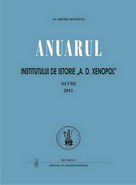GUVERNUL ALEXANDRU AVERESCU ŞI ALIANŢA CU ANTANTA ÎN PRIMUL RĂZBOI MONDIAL. MĂRTURII DOCUMENTARE FRANCEZE
THE EFFORTS OF ALEXANDRU AVERESCU GOVERNMENT TO MAINTAIN THE ALLIANCE WITH THE ALLIES IN THE FIRST WORLD WAR. FRENCH DOCUMENTARY TESTIMONY
Author(s): Hadrian GorunSubject(s): History
Published by: Editura Academiei Române
Keywords: peace, Alexandru Averescu, Antanta, France, negotiations
Summary/Abstract: In this study we tried to analyse Romania’s situation after the armistice of Focşani and during the first three months of the year 1918. Although we dealt with the relations between Romania and the Entente during the last weeks of Bratiano’s government, we stressed – as the title itself suggests – the activity of the new president of the Romanian Council of ministers, Alexandru Averescu. The situation of the country was very difficult because of the armistice that the Bolsheviks signed in Brest-Litovsk in December 1917. From that moment, Rusia has not any longer fought the German enemies. In 13/26th January 1918, Russia broke all diplomatic relations with the Romanian government from Iaşi. Even Ukraine ceased the struggle. So Romania, whose territory was reduced a lot, could receive no support. The General Averescu tried not to break the ties with the Allies. But he also had to deal with the forces of the Central Powers. The Romanian diplomacy attempted to obtain from the Entente’s authorities the maintenance of all commitments concerning its territorial integrity and the new borders of the state. The ministers of France, Great Britain, Italy and U.S.A. from Iaşi received recommen-dations from their governments in order to disagree all negotiations between Romania and Central Powers. In the opinion of the Entente’s authorities, the negotiations between Averescu’s cabinet and the enemy might have as result a separate peace. Among the four powers of the Entente, France was the most intransigent. In fact, all these states strongly rejected the separate peace but the French attitude was more clearly defined that the English attitude for instance. We can also see differences on this topic between the Entente’s diplomatic representatives in the Romanian capital and their governments. The four ministers from Iaşi knew the Romanian realities much better. They all made a proposal regarding a common declaration of the Entente’s countries. Thus, Romania had carried out all its obligations as an allied state and all the actions of the enemy taken in the occupied territory should be condemned. The draconian peace imposed by force should be also revised in the end of the war.
Journal: Anuarul Institutului de Istorie »A.D. Xenopol« - Iaşi
- Issue Year: L/2013
- Issue No: 50
- Page Range: 139-147
- Page Count: 8
- Language: Romanian

